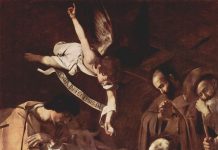Today is the feast of Saint Caecelia, a young virgin martyr in Rome, put to death either in the late second or early third century. She was married, against her will, during which ceremony she ‘sang in her heart to the Lord’. For that one phrase, she was adopted as the patroness of music (her husband, by the way, according to the tradition, respected her wish to remain a virgin, being baptized himself after a vision of the angel protecting Caecelia).
So the story goes, which may or may not be historical. What is historical and real is her patronage of Church music, which, alas, is now much needed, as it is in a sad, even deplorable, state.
This is not the fruit of Vatican II, which had this to say about Church music in its Constitution on the Sacred Liturgy:
The musical tradition of the universal Church is a treasure of inestimable value (pretii inaestimabilis), greater even than that of any other art.
That is saying something, given the ‘inestimable value’ of all the rest of the Church’s art, paintings, buildings, sculptures, mosaics, vestments, chalices and so on and on, ad maiorem Dei gloriam. Yet how much of that ‘musical treasure’ remains locked away, all the chants, the motets, the concerti and recititativos, the traditional hymns, with their rhythmical and deeply theological Latin poetry, gathering dust as the ages go by?
The main reason for this pre-eminence is that, as sacred song united to the words, it forms a necessary or integral part of the solemn liturgy.
The value of the Church’s music is not something it holds on its own, but rather as part of the public worship of God in the Liturgy. Without music, such worship is lessened and attenuated; with tawdry, discordant or just downright banal music, such worship is distorted and even vitiated.
Therefore sacred music is to be considered the more holy in proportion as it is more closely connected with the liturgical action, whether it adds delight to prayer, fosters unity of minds, or confers greater solemnity upon the sacred rites
There is a gradation in ‘good’ Church music, from the most perfect, to the lesser so, to the stuff that should never be heard anywhere near a Church. Ecclesiastical music should be ‘holy’, should lift our hearts and minds above and beyond the secular world, into the consecrated spiritual oasis that is the Liturgy, and especially the Holy Mass. God in His wisdom and providence has given us a music set aside for such a purpose that goes back to the very dawn of the Church:
The Church acknowledges Gregorian chant as specially suited to the Roman liturgy (ut liturgiae romanae proprium): therefore, other things being equal, it should be given pride of place (principem locum) in liturgical services
Notice the term ‘specially suited’, which in the original Latin is ‘proprium‘: Gregorian chant is proper to the Roman liturgy, which means it belongs there as part of its very nature, and something is sorely missing without it.
Of course, other music adds also to the splendour of the Liturgy, “especially polyphony” as the document states, with composers such as Palestrina, Bach, Mozart, Tallis, Byrd, whose music is heard, sadly, now by and large only in secular concert halls, or in churches outside of Liturgy.
And what of instruments?
In the Latin Church the pipe organ is to be held in high esteem (magno in honore habeatur), for it is the traditional musical instrument which adds a wonderful splendor to the Church’s ceremonies and powerfully lifts up man’s mind to God and to higher things.
I have had the pleasure and honour of hearing many fine organs, but, alas, too many churches have either ripped them out, or let them languish, unplayed. As the great J. S. Bach put it, a Lutheran, but in many fundamental ways more Catholic than many modern ‘Catholics’ one might be bold to presume, the organ is the ‘instrument of instruments’, requiring years of dedication to play to full effect. Yet how many churches pay their secretaries and maintenance men well, with full benefits, but hire no one to direct music? Or employ someone whose ‘skill set’ extends to four or five chords on a guitar, belting out emotional ballads, making up in volume what he, or she, lacks in talent? If music really is the most important aspect of Liturgy, besides the actual Liturgy itself, should we not devote more time and effort and, yes, money, to it? Speaking as one of ‘limited talent’, we should have done with volunteers-only music at Mass, with the phrase ‘at least they’re doing something’. If someone cannot sing or play well, then they should not. There are many other charisms in the Church besides music, and silence is better than bad music. There is a phrase attributed to Saint Augustine, which he seems not to have said exactly, ‘qui bene cantat, bis orat’, he who sings well, prays twice. (What the great bishop really said was something to the effect that he who sings with love, but you get my drift, for to love is to will the good of the other, and off-tune singing, at least in the cantor, is not much good).
The Constitution does admit that “other instruments also may be admitted for use in divine worship“, but “only on condition that the instruments are suitable, or can be made suitable, for sacred use, accord with the dignity of the temple, and truly contribute to the edification of the faithful“.
Ah, there we are again, with the ‘apt for sacred use’. Such ‘other instruments’ should not be those we hear the secular realm, banjos, drums and guitars (nothing wrong with them in their own right time and place), but rather those instruments that allow us, again, to transcend the passing form of this world, that fit with the great dignity of God’s temple, and that lead us to holiness. How often have we left Mass unedified, emotionally drained, and rather un-exalted, forced to discern with the sheer force of our intellect and will the great beauty of the Liturgy hiding and obscured behind such banality, or at least secularity, that often passes for modern Church music? As one musician recently put it, and I paraphrase, we are leaving the expensive china and silverware in the cupboard, and serving up the best dishes to God and His people on styrofoam and paper plates.
My exhortation: Reappropriate in whatever way you can the great and inestimable musical treasure of the Church, by attending good Liturgy, by getting involved yourself, learning how to sing and play, and at least learning to appreciate all that is true, good and beautiful in the music handed down to us through the ages of the Church. Doing so is a bit of work at first, but one that is well, well worth the cost. In fact, I am not sure how far we will get without it.
Saint Caecelia, ora pro nobis!











